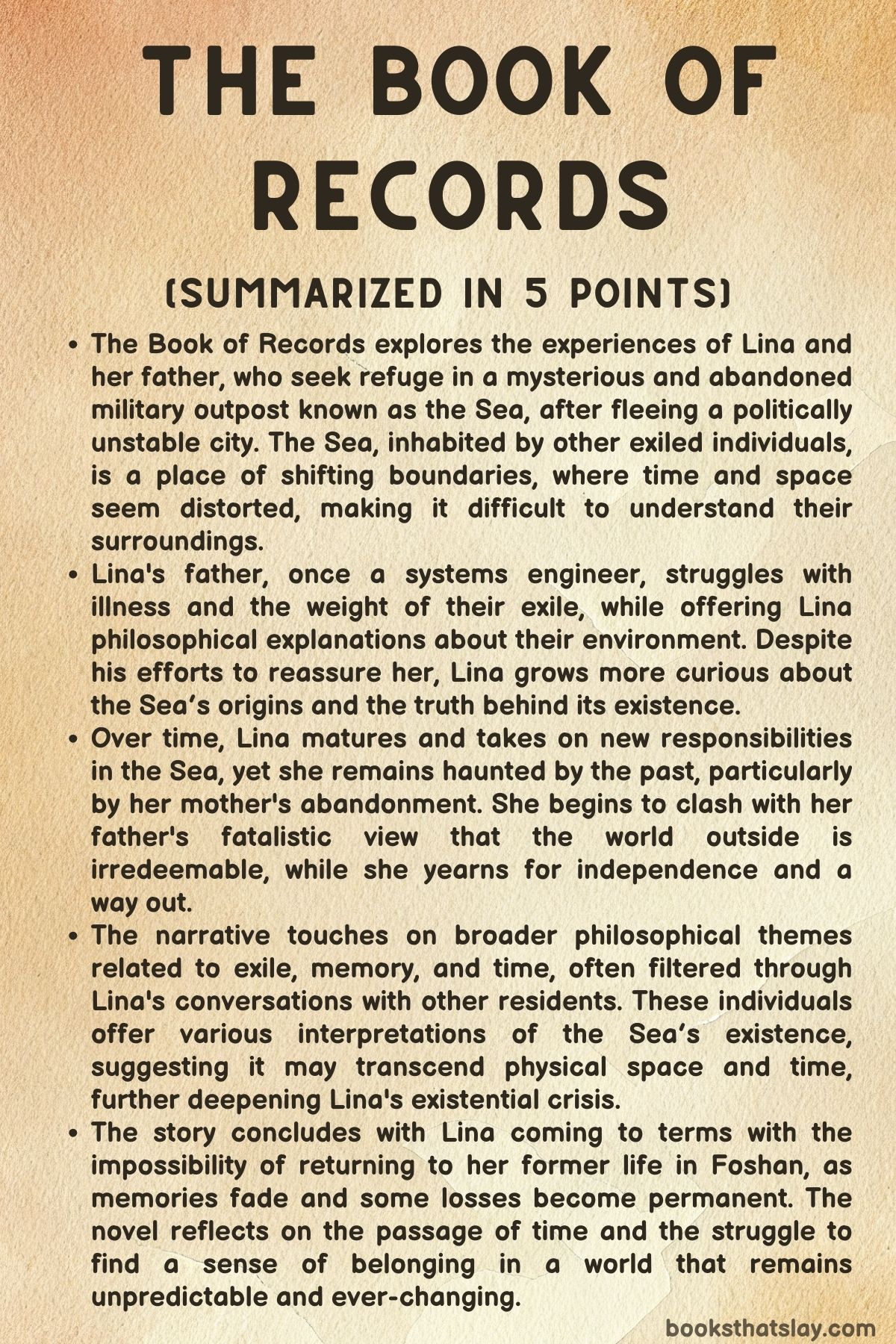The Book of Records Summary, Characters and Themes
The Book of Records by Madeleine Thien is an exploration of displacement, memory, and the struggle to understand one’s place in an uncertain world. The novel follows Lina, a young girl, and her father as they flee their previous life to a mysterious enclave called “the Sea,” a crumbling, abandoned military outpost inhabited by people in similar exiled circumstances.
Within this strange, shifting environment, Lina navigates the complexities of growing up, grappling with her father’s illness, her mother’s abandonment, and the unsettling nature of their surroundings. As Lina matures, she questions the true nature of the Sea and its role in shaping her identity, and her journey reflects broader themes of exile, the passage of time, and the search for belonging.
Summary
Lina and her father arrive at the Sea, an abandoned military outpost transformed into a refuge for people like them—those who have nowhere else to go. The Sea is a peculiar place, a labyrinth of interconnected buildings that shifts and changes with time, creating a distorted sense of space and reality.
It is here that Lina and her father try to rebuild their lives after fleeing the political and social upheaval of Foshan, a city now ravaged by instability. Lina’s father, once a systems engineer, is struggling with illness and the weight of their exile.
His philosophical musings on space and time offer fragmented explanations of their strange surroundings, but they only serve to deepen Lina’s sense of confusion. While Lina’s father is resigned to their situation, believing they have no choice but to accept their fate, Lina yearns for something more—something that would connect her back to the life they lost.
In the Sea, Lina befriends various people, including Jupiter, an elderly man who shares stories of the past. These conversations lead Lina to question the true nature of the Sea and its shifting boundaries.
Some residents speak of the Sea as if it exists outside of time, transcending physical space, and Lina begins to wonder whether the water surrounding the enclave is really the South China Sea or something else entirely. As the years pass, Lina becomes more intrigued by the mysteries of the Sea, which seem to exist in multiple realities.
She grows increasingly obsessed with understanding its origins and the truth behind its strange geography, while also struggling with her growing sense of independence.
Throughout her time in the Sea, Lina deals with the ongoing loss of her family, especially her mother, whose absence continues to haunt her. Her father’s reluctance to leave the Sea stems from his belief that the world beyond has become irreparable, and he seems unable to move forward from the past.
Their differing attitudes toward their situation create tension between them, as Lina desires to leave and find something more while her father embraces the Sea as their permanent home. This conflict highlights the deep philosophical questions surrounding exile, belonging, and the nature of home.
Lina matures over time, taking on responsibilities around the Sea—running errands, helping the other residents, and trading goods. Despite her father’s resignation, she starts to form her own understanding of the world.
Her growing independence pushes her further away from her father, who remains mired in his fatalistic view of their life in exile. He often uses metaphors, such as a string folded into a knot, to explain the concept of time and space, but his explanations are abstract and disconnected from the reality Lina experiences.
Over time, Lina comes to understand that her father’s illness and his reluctance to leave are deeply tied to his belief that the world beyond the Sea is no longer worth returning to.
Lina’s quest to understand the Sea takes on a larger, more philosophical dimension as she engages in conversations with other residents. They discuss the intersection of time, memory, and identity in the context of the Sea, a place where the past, present, and future blur together, leaving behind only fragmented stories.
Her conversations with figures like Jupiter, Bento, and Blucher help her process the mysteries surrounding the Sea and its inhabitants. Each of them offers a different perspective on the world, reflecting the diverse ways in which people cope with exile and the passage of time.
As Lina’s search for meaning grows more intense, she begins to understand that the Sea is not just a physical place, but a metaphor for exile itself—a place where the journey seems endless, with no clear destination. The residents of the Sea are trapped in a constant state of flux, unable to return to their past or truly leave their present circumstances.
This realization deepens Lina’s sense of dislocation, but it also helps her come to terms with the fact that some things in life, like her mother and the family they once had, are lost forever.
In the final chapters, Lina’s understanding of the Sea reaches a turning point. She realizes that her quest to return to Foshan is impossible, not just physically but also existentially.
The memory of her family, particularly her mother, begins to fade, and she comes to accept that some aspects of the past cannot be reclaimed. The novel closes with Lina’s recognition that life itself is a journey marked by loss, uncertainty, and the search for meaning.
The passage of time, like the Sea, is elusive and ever-changing, and the pursuit of belonging is a lifelong endeavor that may never have a definitive conclusion.
Ultimately, The Book of Records is a profound meditation on the nature of exile, the passage of time, and the struggle to find one’s place in a constantly shifting world. Through Lina’s journey, the novel explores the complexities of memory, identity, and the human desire for connection, leaving readers with the understanding that while we may never find all the answers, the search itself is what shapes our lives.
The Sea, like the past, is both an anchor and a mystery, and Lina’s ability to come to terms with it marks her transition from childhood to adulthood, as she learns to navigate the complexities of a life that is always in motion.

Characters
Lina
Lina is the central character of The Book of Records, whose journey embodies the struggle for identity and belonging. Initially introduced as a young girl, her character evolves throughout the narrative, shaped by the overwhelming sense of dislocation and alienation that marks her life in the Sea.
As her family has fled their previous home in Foshan, Lina becomes increasingly fixated on the enigmatic nature of their new environment. Her growing obsession with uncovering the truth behind the Sea’s shifting boundaries and its blurred connection to time and space serves as the lens through which she begins to understand her own fractured sense of self.
She is deeply affected by her mother’s abandonment, and her father’s illness exacerbates her sense of loss. Despite her youthful curiosity, Lina’s maturity develops as she takes on responsibilities within the Sea, helping its transient residents.
However, her internal conflict intensifies as she yearns to escape the Sea and reconnect with her past, even as her father resigns himself to the idea that they can never leave. Through Lina’s journey, the novel explores themes of memory, loss, and the challenges of finding meaning and home in an ever-shifting world.
Lina’s Father
Lina’s father plays a crucial role in shaping the philosophical undercurrents of The Book of Records. Once a systems engineer in Foshan, he now finds himself grappling with illness and the emotional burden of exile.
His philosophical musings about space, time, and the nature of their existence in the Sea provide a sense of intellectual structure in an otherwise chaotic and disorienting environment. However, his detachment from reality and reliance on abstract theories often conflict with Lina’s growing desire for a more tangible understanding of their situation.
His belief that they must remain in the Sea to escape the crumbling empire outside serves as a metaphor for the existential resignation many exiles face when confronting an uncertain future. His character’s journey is one of quiet acceptance, choosing to dwell on metaphysical ideas while neglecting the practical realities of survival and emotional healing.
Ultimately, he symbolizes the clash between philosophical idealism and the harshness of the lived experience, especially in the face of illness, exile, and the relentless passage of time.
Jupiter
Jupiter, an elderly man living in the Sea, becomes one of Lina’s key confidants and provides valuable insight into the labyrinthine environment around them. He represents the collective experience of exile and the complex relationship individuals have with their pasts.
His reflections on the Sea, the past, and the nature of time complement Lina’s search for answers. As a resident of the Sea, Jupiter offers stories that blur the lines between fact and myth, reinforcing the sense of the Sea as a space outside traditional constructs of time and place.
Despite his age, Jupiter remains sharp, questioning the constructs that define their existence and encouraging Lina to think critically about her own understanding of the world. Through Jupiter, the narrative explores the theme of wisdom gained through experience, especially when the past and the present are inextricably tied together in the shared space of exile.
Bento
Bento, another of Lina’s acquaintances in the Sea, is a character who offers a different perspective on the nature of exile. His interactions with Lina lead her to further explore the philosophical and existential dilemmas surrounding their lives in this ever-shifting enclave.
Bento’s life is marked by a constant search for meaning in the fragmented existence that the Sea represents. He and Lina engage in long discussions about the intersection of memory, identity, and the fluidity of time.
His character embodies the existential struggle to find purpose in a place where the past cannot be fully reclaimed and the future is uncertain. Through Bento, The Book of Records delves deeper into the complexities of memory and the ways in which individuals attempt to make sense of their histories while facing the disorienting present.
Blucher
Blucher is another pivotal character in The Book of Records, offering a philosophical perspective on the nature of memory and identity. His interactions with Lina and the other inhabitants of the Sea help to unravel the narrative’s deeper questions about time, space, and the fragmentation of self.
Blucher seems to represent the attempt to preserve a sense of personal history amidst the impermanence of exile. His ideas about the Sea’s strange geography and his own understanding of its transcendence provide Lina with crucial insights into the existential dilemmas she faces.
Through Blucher, the novel highlights the difficulty of maintaining one’s sense of self when placed in a space that defies conventional understanding and structure. His presence underscores the tension between the desire for continuity and the inevitability of change, making him an integral part of Lina’s philosophical journey.
Wui Shin
In a later narrative thread, The Book of Records introduces Wui Shin, a character navigating the complex world of modern-day China. As a tech firm employee, Wui Shin grapples with the moral and ethical implications of his work, which centers around the manipulation of cyberspace and governance systems.
His past is defined by his relationship with his mentor, Professor Tong, who introduced him to a system of knowledge that blends philosophy, mathematics, and information science. Wui Shin’s character arc is defined by his internal conflict as he comes to terms with the destructive consequences of the systems he helped create.
His philosophical musings on the breakdown of structures—referred to as “perforation”—speak to the larger themes of control, chaos, and responsibility that permeate the novel. Wui Shin’s journey is one of personal and professional reckoning, as he realizes the cost of his intellectual pursuits and the unintended consequences they have had on the world and his own identity.
Through Wui Shin, The Book of Records examines the intersection of technology, ethics, and power, highlighting the fragility of human agency in the face of larger systems beyond one’s control.
Du Fu
Du Fu, a poet from ancient China, is another central figure whose life and reflections on the human condition offer a poignant commentary on personal and societal struggles. In his grief over his father’s death and his own failure to achieve success in the imperial bureaucracy, Du Fu embodies the tension between personal aspirations and the harsh realities of life.
His character is marked by internal conflict as he seeks meaning in a world ravaged by political upheaval, war, and natural disasters. His reflections on suffering and the impermanence of human endeavors give depth to his poetic expressions, which serve as a means of coping with the chaotic world around him.
Despite his failure in the civil service exams, Du Fu’s dedication to poetry allows him to find solace and meaning, even as the empire he once hoped to serve falls apart. His journey speaks to the universal themes of failure, loss, and the pursuit of purpose in a world that often seems indifferent to individual struggles.
Hannah Arendt
Hannah Arendt, a central figure in the narrative, navigates the existential dilemmas of war, displacement, and survival during World War II. Her character is defined by her introspective nature and her grappling with the philosophical and moral implications of survival in a world torn apart by conflict.
Through her interactions with Heinrich and other refugees, Arendt reflects on the nature of fate, time, and the choices that people must make under duress. Her journey is a search for meaning amid the horrors of war and the uncertainty of exile, where survival often seems to be the only goal.
Arendt’s character embodies the intellectual struggle to reconcile personal identity with the broader historical forces that shape individual lives, and her journey ultimately leads her to reflect on the randomness of survival and the ethical implications of her choices.
Heinrich
Heinrich, Arendt’s companion throughout their journey, shares in her existential crisis but also provides a contrasting perspective on survival and the search for meaning. His past as a communist and his growing fear of being arrested by the Vichy regime reflect the deeply political nature of their struggle.
As he and Arendt flee to Marseille, Heinrich’s reflections on the futility of their escape underscore the disillusionment that marks their journey. Despite their efforts to survive, Heinrich’s eventual arrest highlights the precariousness of their situation and the broader themes of power, resistance, and fate that are central to The Book of Records.
His relationship with Arendt is one of shared struggle and mutual introspection, and his character serves as a reminder of the personal sacrifices made in the pursuit of survival amidst overwhelming historical forces.
Themes
Displacement and Exile
The theme of displacement and exile is at the forefront in The Book of Records, shaping the lives of its central characters, Lina and her father. Their forced relocation to the Sea, a crumbling military outpost, highlights the disorienting and alienating experience of being uprooted from one’s homeland.
The Sea, an environment of mystery and decay, symbolizes the fractured sense of belonging that those in exile often face. Lina’s father, a former systems engineer, clings to philosophical musings about their existence in the Sea, trying to make sense of a world that has seemingly fallen apart due to political and social upheaval.
His inability to leave the enclave and his belief that the outside world is irredeemable reflect the psychological burdens of displacement, where the past is a constant reminder of what has been lost and the future is uncertain. As Lina matures, she grapples with the dichotomy between her desire to return to a life she can barely remember and the knowledge that the journey of return is not only physically impossible but existentially meaningless.
The Sea represents a liminal space where time and place lose their clarity, illustrating the emotional toll of living in a state of perpetual transition. This constant movement between hope and despair, belonging and alienation, underscores the profound sense of exile that defines the characters’ existence.
The Sea, with its shifting boundaries, becomes a metaphor for the fragmented nature of memory and identity in the experience of displacement.
Memory and Loss
Memory, or more specifically the erosion of memory, is another significant theme in The Book of Records. Lina’s search for the truth behind the Sea’s origins is ultimately a search for her own lost memories and a deeper understanding of her past.
Her obsession with the Sea’s shifting geography parallels her longing to reconnect with her past life, particularly her memories of her mother and the world they left behind. However, as time passes, she begins to realize that memory itself is unreliable, fragmented, and often fleeting.
This loss is not just a personal journey for Lina but a universal exploration of how individuals cope with the fading of their identities and histories. Lina’s father, too, is trapped in the decay of memory—his intellectual constructs about time and space, while meant to comfort and provide clarity, only serve to deepen his isolation and sense of dislocation.
As Lina grows older, she learns to accept the idea that some things, like the memory of her mother, are gone forever, unable to be retrieved or fully understood. The narrative thus explores how memory can both anchor and betray, offering glimpses of the past while also pushing it further out of reach.
The pain of loss is intertwined with the acceptance that some memories must remain lost, and that moving forward often requires letting go of the past.
The Nature of Home
The concept of home is another central theme that permeates The Book of Records, explored through Lina’s complex relationship with the Sea and her yearning for the stability and security that home represents. Initially, the Sea is a strange and unfriendly environment, its boundaries unclear and ever-changing.
For Lina, the idea of home is something that must be found rather than given, a place where she can feel a sense of belonging and safety. However, as the narrative unfolds, Lina comes to understand that home is not a static concept tied to a specific location or identity but rather a fluid, evolving idea.
Her search for a return to Foshan, the place of her birth, becomes a futile quest as she realizes that no place can truly offer her the sense of home she desires. The Sea, for all its disarray, becomes home in its own peculiar way, a place where she learns to navigate the complexities of survival, loss, and the ongoing process of self-discovery.
This evolving notion of home reflects the larger existential truth that home is not merely a geographical location but a state of being—a balance between memory, identity, and belonging. For Lina, home is no longer defined by the place she once knew but by the acceptance of her current reality, where the journey to understanding and self-acceptance becomes the true measure of home.
The Passage of Time and its Distortions
In The Book of Records, time is portrayed not as a linear progression but as something more fluid and fragmented. The Sea itself is a place where the usual markers of time seem distorted, where past, present, and future blur together, creating an environment where time feels both suspended and in perpetual motion.
This disorientation is compounded by the characters’ experiences of exile, where their lives have been disrupted and disconnected from the natural flow of time. For Lina, time becomes a source of confusion and alienation.
The years she spends in the Sea are marked by a sense of stasis, yet the constant changes in the enclave’s physical and social landscape suggest that time is never fully under control. Her growing awareness of the Sea’s shifting geography reflects a deeper existential questioning of how time affects memory, identity, and belonging.
Time becomes both an oppressive force and a fleeting concept, particularly for her father, whose philosophical musings on time and space, though intellectually intriguing, fail to offer a concrete sense of reality. Ultimately, the theme of time underscores the emotional and psychological struggles of living in a world where the passage of time is not only unpredictable but also capable of erasing the very essence of who we are.
The Search for Meaning and Existential Reflection
The Book of Records is deeply concerned with the search for meaning in a world that often appears indifferent to human suffering. Lina’s journey is not just one of physical displacement but of philosophical inquiry, as she questions the nature of existence, identity, and the elusive nature of truth.
The conversations she has with various residents of the Sea reflect different interpretations of the world and existence, yet none of them seem to offer definitive answers. These philosophical exchanges, particularly with figures like Jupiter, Bento, and Blucher, highlight the tension between seeking meaning in an uncertain world and accepting the possibility that some things may never be fully understood.
Her father’s philosophical teachings, rooted in abstract theories of time and space, ultimately fail to provide solace, and Lina’s growing realization that the search for certainty might be an impossible task echoes the existential reflections found throughout the narrative. The theme of existential reflection invites readers to consider the deeper implications of the characters’ lives, where survival itself often becomes the only meaningful pursuit.
Ultimately, the book suggests that the search for meaning is both a fundamental human drive and an inherently elusive goal, as the answers to life’s most pressing questions may always remain just beyond our grasp.
The Impact of Political and Social Upheaval
The backdrop of The Book of Records is one of political and social upheaval, which plays a crucial role in shaping the lives of the characters. Lina and her father’s displacement from Foshan is not a random event but a consequence of the larger political forces that are tearing apart their world.
The collapse of the empire, the political instability, and the social turbulence that follow force the characters into a life of uncertainty, where survival becomes the primary concern. The novel explores how individuals, particularly those caught in the throes of political change, are often at the mercy of forces they cannot control.
Lina’s father, though deeply affected by the political shifts, tries to rationalize their situation through his philosophical lens, but the broader societal collapse challenges any hope for a return to stability. The impact of these political forces is not just external but internal, affecting how the characters view their future and their place in the world.
The political upheaval, while abstract in some ways, is a constant presence that shapes the characters’ emotional and intellectual journeys, reminding readers of the pervasive influence of larger societal structures on personal lives. Through Lina’s journey, the novel suggests that political and social turmoil not only disrupts daily life but also distorts the sense of self, memory, and belonging.


